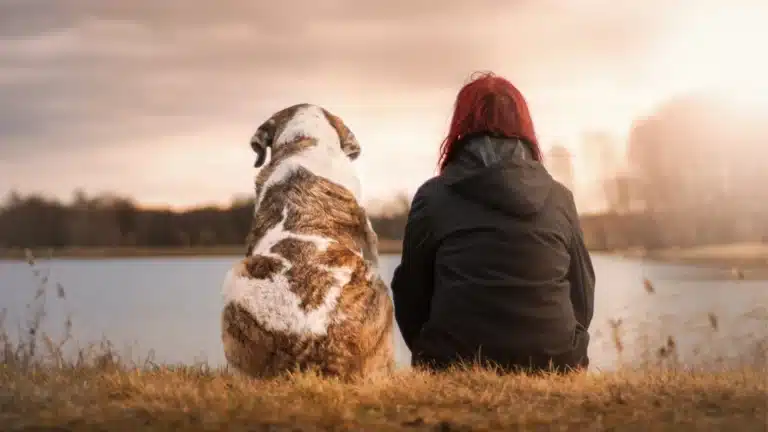Why Does My Dog Follow Me Everywhere
Have you ever noticed that no matter where you go, whether it’s the kitchen, the bathroom, or even just across the room, your dog is right behind you?
If you’ve ever asked yourself, “Why does my dog follow me everywhere?” you’re not alone! Many dog owners experience this behaviour, and while it’s often adorable, it can also leave you wondering what’s really going on in your pup’s mind. Is it love, instinct, or something more complex?

Instinctual Pack Behavior
To understand why your dog follows you, we need to look at how dogs think. Dogs are descendants of wolves, which live in structured groups called packs. In the wild, wolves stick together because it helps them survive. They follow the pack leader for safety, food, and guidance.
Despite living in a safe home environment, domestic dogs still carry this pack mentality. To them, you are their pack leader, protector, and source of comfort.
Your Dog Loves You and Wants to Be Near You
One of the most heartwarming reasons your dog follows you? They adore you. Dogs are incredibly affectionate animals that form deep emotional connections with their owners. Dogs don’t just see their owners as caretakers. They see you as family. Much like a child seeks comfort from a parent, dogs naturally gravitate toward the person who provides them with food, shelter, affection and play.
Have you ever noticed how your dog sighs contentedly when they curls up next to you? That’s love in its purest form. They aren’t just following you. They choose to be with you because you make them feel safe and happy at home.
Your Dog Is Curious and Doesn't Want to Miss Out
Dogs are naturally curious creatures, constantly eager to be involved in whatever their owners are doing. When you move from one room to another, they often wonder what you’re up to, whether something exciting is happening, if there’s food involved, or if they might miss out on playtime or attention. This leads them to follow you, even if they were resting moments before.
They become more curious when remembering past experiences, especially if certain places are associated with rewards. For instance, if your dog associates the kitchen with treats, they’ll eagerly trail behind you, hoping for a treat. Similarly, grabbing your shoes may remind them to rush to the door in excitement for a walk, and the sound of your car keys might suggest an adventure is on the horizon.
Your Dog May Have Separation Anxiety
While it’s common for dogs to follow their owners out of affection and curiosity, excessive following can sometimes indicate anxiety. If your dog becomes distressed when you leave, exhibits signs like whining, barking, or howling when alone, paces or scratches at doors, engages in destructive behaviour or refuses to eat or drink while you’re away, these may be indicators of separation anxiety.
Dogs with this condition don’t just follow you out of love. They feel unsafe when you’re not around. Their behaviour can become compulsive, driven by a fear of being left alone. In such cases, it’s important to help them build confidence and teach them that being alone is not frightening.
To address separation anxiety, consider training your dog to feel comfortable alone, providing them with engaging toys to occupy their time, and consulting a dog trainer for assistance. Taking these steps can help your dog manage their anxiety and foster a more secure and independent mindset.
Reinforced Behavior
Dogs are intelligent animals that learn through their experiences. When a dog receives rewards, such as treats, attention, or affection when they follow you, they are likely to continue that behaviour. For instance, giving a treat for following you into the kitchen, allowing them to sit on your lap when you move to the couch, or offering praise when they are near you reinforces their desire to stay close. When a dog receives rewards, such as treats, attention, or affection when they follow you, they are likely to continue that behaviour.
However, if you want to encourage a greater sense of independence in your dog, consider rewarding them for staying in one spot instead of always following you. Although showing love and affection is important, adjusting how you reward your dog can help them become more self-sufficient. Suppose they have learned that following you results in rewards. In that case, they will naturally continue to seek that behaviour unless guided otherwise. You can foster a better balance in their behaviour by rewarding them for independence.
Some Breeds Are More Clingy by Nature
Certain breeds were developed to be companions, herding dogs, or guardian dogs; those instincts still influence their behaviour today.
If you own one of these breeds, their following behaviour isn’t just habit; it’s instinct!
- Herding Dogs (Border Collies, Australian Shepherds): Bred to control livestock, they have a natural instinct to stay close and keep an eye on their “flock” (which includes you!).
- Guardian Breeds (German Shepherds, Rottweilers, Dobermans): Their job is to protect, so staying close to you is part of their nature.
- Companion Breeds (Pugs, Chihuahuas, French Bulldogs): These breeds were bred to be lapdogs and prefer being near their humans.
Your Dog Feels Safer When They're With You
Dogs often look to their owners for comfort and security, especially during stress or uncertainty. When a dog follows you more than usual, it may be a sign that they feel nervous due to loud noises or storms, unsure of new environments or routines, or even unwell. For many dogs, their owners represent a safe haven, and they instinctively seek their presence to feel secure. This behaviour reflects their trust in you to protect them, whether during thunderstorms, in unfamiliar surroundings, or visits from strangers. Ultimately, dogs rely on their owners not just for basic needs like food and shelter but for emotional support as well. They communicate a simple yet profound message when they stay close: “I feel safe when I’m with you.”
How to Manage Your Dog's Following Behavior
If you cherish your dog’s companionship but wish to foster a sense of independence, there are effective strategies you can implement. Begin by providing engaging toys that keep your dog entertained. Options like puzzles, chewing, or food-dispensing toys can be wonderful distractions that stimulate their minds.
Be mindful of unintended reinforcement; if you consistently reward your dog for following you, they may continue that behaviour instead of learning to stay put. Instead, focus on rewarding them for remaining in one spot. If separation anxiety is an issue, start with shorter absences and gradually extend the time apart, leaving them with a favourite toy or a piece of your clothing to provide comfort. Over time, your dog will become more accustomed to being alone and learn that you will always return.
Your dog follows you everywhere because they genuinely love and trust you, cherishing the close bond you share. Whether it’s instinct, affection, curiosity, or simply a habit, their constant presence serves as a reminder of the unique relationship. Take a moment to appreciate the unconditional love and devotion they bring into your life; it’s one of the greatest joys of having a dog as your best friend.
